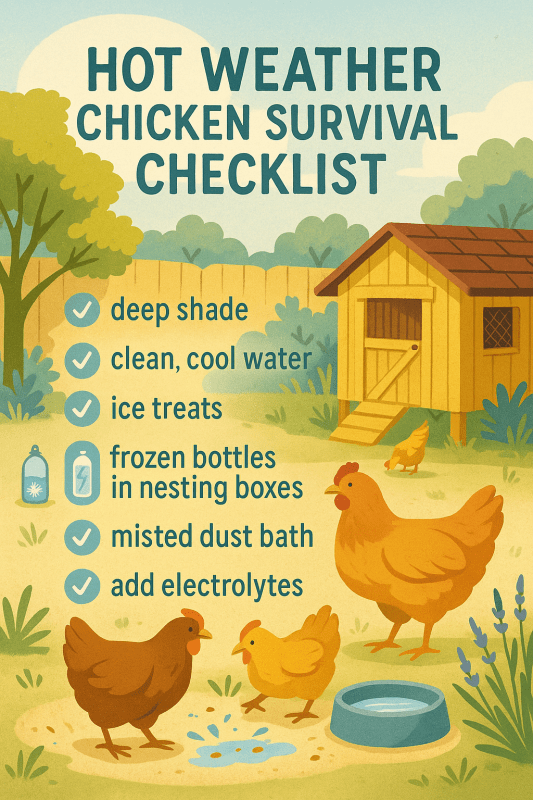Setting Up the Perfect Chicken Coop: Essential Supplies for a Comfortable Home
When it comes to raising chickens, creating a comfortable and secure home for them is essential. A well-designed chicken coop not only provides a safe environment but also contributes to the overall health and well-being of your feathered friends. If you're new to chicken keeping or looking to improve your existing setup, here are some essential supplies you'll need to set up the perfect chicken coop.
1. Adequate Space
First and foremost, your chicken coop should offer ample space for your flock to move around freely. Chickens that are overcrowded can become stressed and may even exhibit aggressive behavior towards each other. As a general guideline, provide at least 2-3 square feet per chicken inside the coop and 8-10 square feet per chicken in the outdoor run area.
2. Sturdy Construction
A well-built and secure chicken coop is crucial to protect your birds from predators such as foxes, raccoons, or even neighborhood dogs. Use sturdy materials for the coop walls, floor, and roof to ensure it can withstand the elements and potential attacks. Consider reinforcing vulnerable areas like doors and windows with strong wire mesh or hardware cloth.
3. Ventilation
Proper ventilation is vital for maintaining good air quality inside the coop. Adequate airflow helps reduce moisture buildup and prevents the growth of harmful bacteria. Make sure your chicken coop has enough windows or vents that can be opened and closed as needed to regulate temperature and humidity levels.
4. Nesting Boxes
Every hen needs a comfortable place to lay her eggs, so providing nesting boxes is essential. These boxes should be dark and cozy, lined with soft bedding material such as straw or wood shavings. Aim for one nesting box per 3-4 hens, ensuring they are easily accessible for egg collection.
5. Roosting Bars
Hens naturally prefer to perch off the ground when resting or sleeping. Install roosting bars inside your chicken coop, allowing approximately 8-10 inches of space per hen. Make sure the bars are of a suitable diameter and smooth, preventing any potential foot injuries.
6. Feeders and Waterers
Keeping your chickens well-fed and hydrated is essential for their health and productivity. Invest in sturdy feeders that are elevated off the ground to prevent contamination and wastage. Similarly, choose waterers that are easy to clean and refill, ensuring a constant supply of fresh, clean water for your flock.
7. Bedding Material
Using suitable bedding material in the coop helps absorb moisture and provides insulation. Common options include straw, wood shavings, or even shredded paper. Regularly clean and replace the bedding to maintain a hygienic environment for your chickens.
8. Lighting
Lighting plays a crucial role in regulating your hens' egg-laying patterns. Installing artificial lights in the coop during winter months can help maintain a consistent day-night cycle, encouraging continued egg production even when daylight hours are shorter.
Setting up the perfect chicken coop requires careful planning and attention to detail. By providing your feathered friends with the essential supplies mentioned above, you'll be well on your way to creating a comfortable and secure home for your flock.
Feeding Your Feathered Friends: Must-Have Essentials for a Healthy Chicken Diet
When it comes to raising chickens, providing them with a healthy and balanced diet is crucial. Just like any other animals, chickens need a variety of nutrients to stay healthy and thrive. Here are some must-have essentials to include in their diet:
1. High-Quality Chicken Feed
The foundation of a chicken's diet is a good quality chicken feed. This balanced feed should contain a mix of grains, vitamins, minerals, and proteins that cater to the specific nutritional requirements of chickens. Look for feeds labeled as "complete" or "all-purpose," which are formulated to provide all the necessary nutrients chickens need.
2. Fresh Water
Just like humans, chickens need access to fresh and clean water at all times. Ensure they have a constant supply of water, and regularly check that it is not contaminated or frozen during colder seasons. Lack of water can lead to dehydration and other health issues in chickens.
3. Supplements
In addition to their main feed, supplementing your chicken's diet with certain supplements can be beneficial. Some common supplements include:
- Grit: Chickens do not have teeth, so they need grit to grind their food in their gizzard. Offering coarse grit like crushed granite or small stones allows them to break down their food properly.
- Calcium: Calcium is essential for egg-laying hens, as it helps develop strong eggshells. You can provide calcium through crushed oyster shells or eggshells.
- Treats: Treats like fresh fruits, vegetables, or mealworms can be used sparingly as rewards or to provide some variety. However, they should not make up more than 10% of their overall diet.
- Probiotics: Probiotics can help maintain a healthy gut flora in chickens, promoting proper digestion and overall health. Adding probiotics to their water or feed can be beneficial.
4. Free-Range Opportunities
Allowing your chickens to free-range can be a great way to supplement their diet. By foraging in the yard, they can munch on insects, worms, grass, and seeds, which provide additional nutrients and exercise for them. However, ensure your property is secure and free from any potential dangers, such as predators or toxic plants.
5. Clean Feeding and Storage Containers
Keeping your chicken's food and water containers clean is essential to prevent the growth of harmful bacteria and fungi. Regularly wash and sanitize their feeding and watering equipment to maintain optimal hygiene.
6. Monitor and Adjust
Pay attention to your chickens' dietary needs and observe their behavior and overall health. Adjust their diet as needed and consult with a poultry nutritionist or veterinarian if you observe any abnormalities or concerns.
Providing your chickens with a healthy diet is vital for their growth, egg production, and overall well-being. By focusing on these essential elements, you can keep your feathered friends happy, healthy, and thriving.
Safeguarding Your Flock: Essential Tools and Practices for Keeping Chickens Safe and Secure
When it comes to raising chickens, ensuring their safety and security is of utmost importance. Here are some essential tools and practices that will help you safeguard your flock and keep them protected from potential threats:
1. Sturdy Coop
A well-built and secure chicken coop is the foundation of chicken safety. Make sure the coop is predator-proof, with strong walls, a solid roof, and secure doors. Regularly inspect and reinforce any weak areas to prevent predators from getting in.
2. Secure Fencing
Install a high-quality fencing around the coop and run area to keep your chickens from wandering off and to keep predators out. Use mesh with small openings to prevent larger animals from squeezing through.
3. Predator Deterrents
Consider using deterrents such as motion-activated lights, scarecrows, or even a guard dog to discourage predators from approaching the flock. Regularly check for signs of predators and take necessary steps to keep them away.
4. Lockable Doors
Ensure all coop doors are lockable, including both the main entrance and any smaller access points. This will help protect the chickens at night and during times of potential danger.
5. Proper Ventilation
Good ventilation is crucial for a healthy coop environment, as it prevents the buildup of excess moisture and harmful gases. Install vents with hardware cloth or mesh to ensure proper airflow while keeping predators out.
6. Regular Cleaning and Maintenance
Maintaining a clean and hygienic coop is essential in preventing diseases and attracting predators. Regularly remove droppings, replace bedding, and inspect for any signs of damage or weakness in the structure.
7. Nest Boxes
Provide comfortable and secure nest boxes for your hens to lay their eggs. These boxes should be raised off the ground to prevent predators from accessing them, and equipped with a locking mechanism to keep eggs safe.
8. Food and Water Safety
Keep chicken feed and water in secure containers that are inaccessible to potential pests, such as rats or wild birds. Regularly check for signs of contamination and replace any spoiled food or water to ensure the health of your flock.
9. Regular Health Checks
Schedule regular health checks for your chickens to identify any signs of illness or parasites. Consult with a veterinarian for preventive measures and to address any health concerns promptly.
By implementing these essential tools and practices, you can provide a safe and secure environment for your flock, giving them the best chance to thrive and ensuring their well-being as you enjoy the benefits of raising your own chickens.


